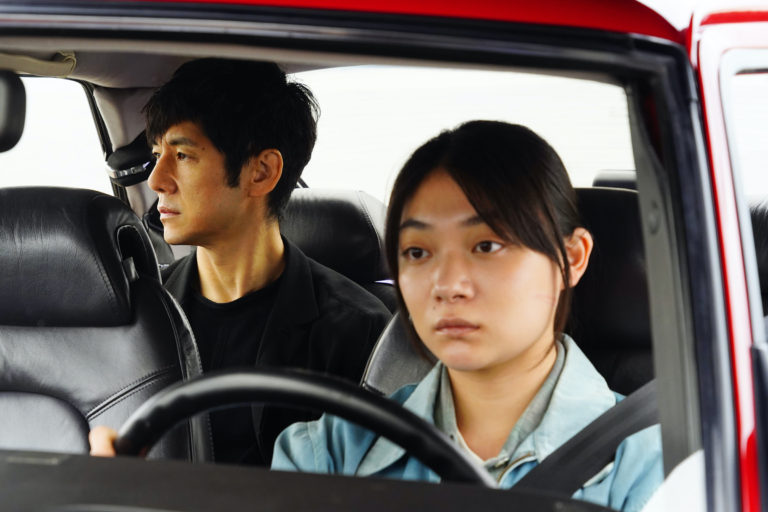Drive My Car (2021 | Japan | 179 Minutes | Ryusuke Hamaguchi)
Where other directors might try to compress a sprawling novel into a feature film, Ryusuke Hamaguchi’s three hour long adaptation of a short story is the definition of patience rewarded. For me, nothing has better replicated the feeling of being completely enveloped by Haruki Murakami’s (translated) prose quite like Drive My Car, with the substantial benefit that his rendering comes without the unpleasant surprise of the squicky and ghosty elements that the novelist is so fond of exploring. I admit to being wary of the long running time when I queued up the screener, but by the end I began to worry that each minute would be the last.
While some of the novelistic feeling evoked by watching the film in a dark, distraction-free room may be attributable to actually reading the subtitles, nearly all of the most evocative scenes in Drive My Car aren’t depicted on screen. Instead, they’re revealed in the stories, conversations, and confessions shared between sad, lonely people seeking connections.
The film opens with such an exchange. In the post-coital glow, a woman sits up in bed and recounts a story of teenage obsession to her lover. Her tale goes on for several minutes, during which we see only her silhouette against the fading light of a saturated evening sky through the wall of windows. But the lack of dramatic re-enactment makes the story all the more compelling; like her drowsy husband, we’re captivated by her every word and intonation, left wondering how the story will resolve. By morning, she’ll have forgotten the story, but her husband will recount it to her on their drive to work. He’s an esteemed actor and theater director (Hidetoshi Nishijima as Yūsuke Kafukuan); she’s a successful high-level television producer (Reika Kirishima as Kafuku’s Wife, Oto). Their back-and-forth has become a mysterious part of her process in developing new shows.
His creative habit is a bit more straightforward but still highly codified. While commuting in his beloved, late-model, cherry red Saab he listens to lines of dialogue from his play, with his parts omitted so that he can perfectly master the timing. It’s an essential part of his unique style of staging great works of theater: each actor speaks the lines in their native language and translations appear behind them as supertitles. These Babel-like renditions expose a sense of universality while also requiring immense levels of precision and rehearsal.
The credits don’t even appear until the forty-minute mark as we see Yūsuke’s sensible red car making a cross-country drive in the wake of a drastic change in his domestic situations. By this point, we’ve learned more about the odd dimensions of his marriage, seen some conflicts stoically repressed, and witnessed the toll that playing the title role in Uncle Vanya takes on Yūsuke. When he arrives at the end of his journey, we find that he’ll be spending a prestigious residency in Hiroshima to stage a new version of the play with fresh actors.
Per his request, the theater company has set him up with lodging far outside the city in a traditional house overlooking the sea to give him a sense of peace and a long daily commute to focus on his methods. To his objection and disappointment, they insist on assigning him a quiet and businesslike driver (Tōko Miura as Misaki Watari). His objection isn’t because she’s a young woman, but because having someone else pilot his car will interfere with his solitary time with the tapes. But it’s a country of contracts and politeness; so he grudgingly accepts and so begins a delicate process of interpersonal barriers gently eroding.
One might worry that the preparation of a new production and long drives back and forth is not enough plot to sustain the remaining two hours, but the process is fascinating, from the casting calls – in which a hot young actor with a troubled past (Masaki Okada as Kōji Takatsuki) makes a surprise re-appearance and a mute actress who communicates her lines in Korean sign language (an incredible Yoo-rim Park as Yoon-a) – to the relentless, confoundingly robotic table reads. As meticulous line readings give way to the stage, even those unfamiliar Uncle Vanya will have gotten a sense of most of the play and will recognize Chekov’s most famous literary technique lying in wait.
Some of the parallels to the play might be a little on the nose, but it’s hard to begrudge such a sturdy structure for getting to know all of these characters, their regrets, and longings. That the actors accomplish such depth, almost entirely through conversations, often in cars, and rarely even face-to-face is a testament to the talents of the cast and filmmakers. Yūsuke’s style of performing the play is a testament to art’s ability to transcend language, just as Hamaguchi’s choices in directing the film are a leap of faith in the astonishing power of actors to communicate tremendous emotion through restrained performances. As the hours melt away in sterile rehearsal rooms, repetitive commutes, and over drinks in hotel bars, the cinematic techniques may not be especially showy, but it’s largely because of this that each moment of aching beauty and quiet personal revelations hit like fireworks.
Drive My Car arrives in theaters on December 10. Treat yourself to three distraction-free hours in the dark by seeing it locally at the SIFF Uptown.




